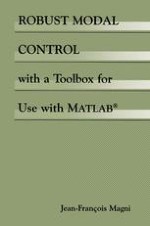
2002 | OriginalPaper | Buchkapitel
Introduction
verfasst von : Jean-François Magni
Erschienen in: Robust Modal Control with a Toolbox for Use with MATLAB®
Verlag: Springer US
Enthalten in: Professional Book Archive
Aktivieren Sie unsere intelligente Suche, um passende Fachinhalte oder Patente zu finden.
Wählen Sie Textabschnitte aus um mit Künstlicher Intelligenz passenden Patente zu finden. powered by
Markieren Sie Textabschnitte, um KI-gestützt weitere passende Inhalte zu finden. powered by
Robust control theory has received much attention in the past decades. The most popular approaches are based on frequency domain analysis and design. Early work in this field can be found in [Rosenbrok, 1974], or [Horowitz, 1991]. The most representative modern frequency domain techniques are Loop Transfer Recovery [Doyle and Stein, 1979, Maciejowski, 1989],H∞-synthesis [Doyle et al., 1989, McFarlane and Glover, 1990], µ-synthesis [Zhou and Doyle, 1999] and their LMI-based (Linear Matrix Inequality) extensions. Unfortunately, these techniques are not very efficient for problems with respect to real parameter variations. Alternative techniques which are involving robustness more appropriate for dealing with real uncertainties have also been considered, for example: quadratic stability [Garcia et al., 1997, Khargonekar et al., 1990], adaptation of µ-synthesis [Young, 1996] value set and parameter space techniques [Barmish, 1994, Ackermann, 1993] and so on. But for various reasons (such as: conservatism — special requirements relative to the dependency on uncertainties — limitations on the number of uncertainties — very large controller orders) these techniques do not really solve the general problem. As we shall see in this book, multi-model control design based on modal approaches, despite some more or less heuristic features, is very efficient, especially in the case of real uncertainties.